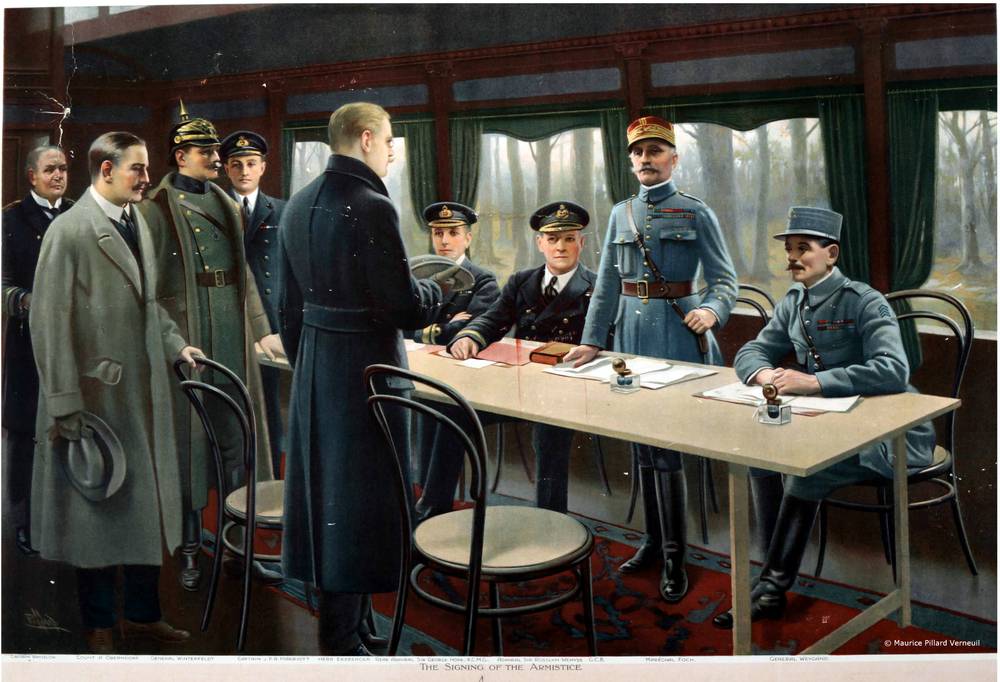I'm not giving a one line answer to a complex issue.
It's not that complex.
The German ultimatum to Russia didn't even include the word 'war' only that Germany would order 'full mobilisation', oh and you have 12 hours to reply. However, at the same time the Germans activated
Kriegsgefahrzustand: all railway lines and depots were commandeered; the press controlled; martial law proclaimed; troops ordered to return to their garrisons and reserves called up – every measure executed short of actually moving the troops to the border.
Jules Cambon wrote:
The whole theory of German blamelessness rests on the fact that it was Russia who first ordered mobilization, thus forcing her adversaries’ hands. The one thing overlooked is that no comparison could be drawn between Russian and German Mobilization; that while one took several weeks to complete, the other required only a few days; that there existed in Germany a formidable institution in the ‘Imminent Danger of War’, tantamount to mobilization in advance.
Its worthwhile reproducing this helpful timeline from 1914: The Year the World Ended by Paul Ham.
Timeline of Russian mobilisation in 1914
St Petersburg, 25 July: Russia secretly decides to order ‘preparatory’ mobilisation, in
response to Austria’s ultimatum to Serbia.
Berlin, 27 July: German foreign minister Jagow assures the Entente powers that Germany would not mobilise if Russia’s partial deployment were directed only at Austria.
Vienna/Belgrade, 28 July: Austria-Hungary declares war on Serbia.
Berlin, 28 July, morning: Bethmann-Hollweg advises the Kaiser to write to the Tsar, initiating the Willy–Nicky telegrams, a diplomatic strategy designed to brand Russia the aggressor. German war minister Erich von Falkenhayn, with the Kaiser’s support, orders troops on manoeuvres to return to their garrisons.
German ‘partial’ mobilisation secretly begins.
St Petersburg, 28 July, afternoon: The Russian Government, in response to the Austrian declaration of war, informs Berlin that it intends to mobilise the military districts of Odessa, Kiev, Moscow and Kazan.
It promises its partial mobilisation will pose no threat to Germany Russian military experts object to ‘partial mobilisation’ because it threatens to derail their plans for full mobilisation.
London, 29 July, morning: Britain sends an official ‘warning telegram’ authorising the secret, partial mobilisation of the fleet. The First Squadron continues to Scapa Flow, and the Second and Third Squadrons are held at their bases.
Berlin, 29 July: In a long, hair-raising memorandum to Bethmann-Hollweg, Moltke presses for German war readiness in response to any Russian move, disavowing Jagow’s earlier assurances of restraint. Russia, he writes, has ‘cunningly contrived’ to provoke Germany to instigate hostilities, by gradually mobilising. If Germany fully mobilised, Russia and her French ally could then claim Germany started it, ‘and the mutual butchery of the civilised nations of Europe will begin’. He concludes, ‘The military situation is becoming from day to day more unfavourable for us, and can, if our prospective opponents prepare themselves further, unmolested, lead to fateful consequences for us.’
Paris, 29 July: Poincaré and Viviani arrive back in Paris, and immediately urge Russia not to give Germany any pretext for general mobilisation.
Berlin, 4 pm, 29 July: The German General Staff receives the disquieting news that Belgium means to resist invasion. Brussels calls up reserves, doubling its effective strength to 100,000, and reinforces fortifications and border defences.
St Petersburg, 29 July, day—evening: Russia receives news of Austria’s bombing of Belgrade. Sazonov angrily informs the Austrian ambassador, ‘You are only wanting to gain time by negotiations and are meanwhile advancing and bombarding an unprotected city.’ That night, Sazonov, the minister for war Vladimir Sukhomlinov and the chief of the General Staff Lieutenant General Yanushkevich order full mobilisation: ‘in view of the small probability of avoiding a war with Germany [we must] prepare for it in every way … the risk could not be accepted of delaying a general mobilisation later by effecting a partial mobilisation now’. Sazonov telephones the result to the Tsar. Nicholas, with extreme reluctance, signs two mobilisation ukases, one for partial, the other for general, to be used as events dictate. He thus gives the military a free hand to act as they see fit.
St Petersburg, nearing midnight, 29 July (the timing is disputed): Sazonov makes a perfunctory offer to Berlin to suspend all ‘military preparations’ if Austria halts at Belgrade and withdraws the harshest terms of its ultimatum to Serbia
. Germany refuses.
St Petersburg, before midnight, 29 July: The Tsar, extremely agitated, telephones the war minister to downgrade the general mobilisation order to ‘partial’. The reason, he says, is that he has received an offer from the Kaiser to mediate between Vienna and Belgrade. Wilhelm’s closing words –
‘of course, military measures on the part of Russia … would precipitate a calamity we both wish to avoid and jeopardise my position as mediator’ – persuade the Tsar to reverse the general mobilisation order. ‘I will not become responsible for a monstrous slaughter,’ Nicholas exclaims. The Russian Army is furious. ‘[M]obilization,’ Sukhomlinov argues, ‘is not a mechanical process which one can arrest at will, as one can a wagon, and then set in motion again.’ But the Tsar insists, and the partial mobilisation order is enacted at midnight (though it is questionable whether the general obeys).
Berlin, 1.45 am, 30 July: The Tsar unwisely informs the Kaiser that ‘the military measures [partial mobilisation in four cities] which have now come into force were decided five days ago for reasons of defence on account of Austria’s preparations’ and were in no sense meant to interfere with the Kaiser’s role as ‘mediator’. Wilhelm
interprets this as ‘full mobilisation’ and writes angrily in the margin that the Russians were now:
a week ahead of us … I cannot agree to any more mediation since the Tsar … has secretly mobilised behind my back. It is only a manoeuvre, in order to hold us back and increase the start they have already got. My work is at an end!